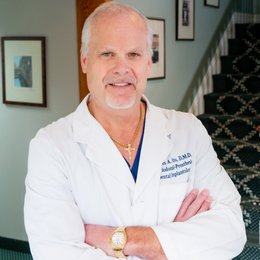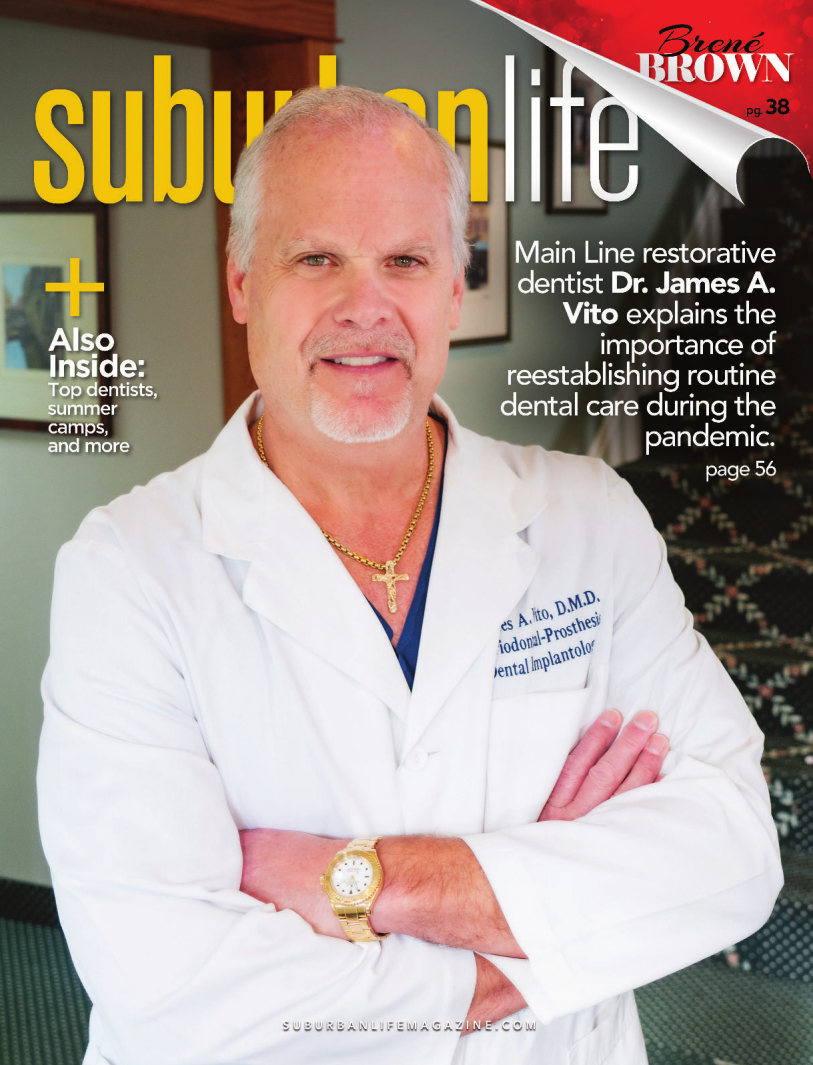
COVID-19's Effect on Oral and Systemic Health
Main Line restorative dentist Dr. James A. Vito explains the importance of reestablishing routine dental care during the pandemic.
During the first wave of the COVID-19 outbreak, dental practices around the world were forced to close. For two to three months, all dental appointments had to be postponed or cancelled, except for urgent emergency treatments. The World Health Organization reported that oral health services were among the most affected essential health services because of the COVID-19 pandemic, with 77 percent of countries reporting partial or complete disruption.
A recent survey indicates that oral health professionals have significantly lower SARS-CoV-2 infection rates than other healthcare workers in most parts of the world. In other words, going to the dentist has been demonstrated to be very safe.
Patients have returned to the dental office. Because their routine dental exams and procedures were forced to be postponed, however, dentists have seen increases in gum issues, periodontal disease, dry mouth, cavities, broken teeth, and temporomandibular joint (TMJ) issues, to name a few.
Dental caries that could have been treated with a simple restoration have progressed to the stage of developing abscesses requiring root canal therapy, buildup, and crown, or damaged to the point where the tooth cannot be saved. This then results in the need for the tooth’s replacement with either a dental implant or a dental bridge, both of which are more involved and more expensive than a routine filling.
Other symptoms, such as a lost or altered sense of taste, dry mouth, and sores are common among COVID-19 patients, and those symptoms may last long after others disappear. Nearly four in 10 COVID patients experience impaired taste or a total loss of taste, but dry mouth affects even more—up to 43 percent of all COVID patients. While it’s not clear how long oral symptoms may persist, it appears that they can be part of the constellation of symptoms known as “long COVID.”
Dry mouth, or xerostomia, occurs when there is inadequate saliva to keep the mouth moist. This makes it difficult to break down food, wash food particles away from the mouth, and swallow food. Dry mouth, which may be an early symptom of COVID-19, is one of the most common oral symptoms.
Dry mouth creates two unwanted situations. First, it increases the incidence of mild to moderate gum disease, called gingivitis, which occurs when routine hygiene care is not provided or suspended for any length of time. A more severe form, called periodontitis, occurs in patients who are prone to gum disease and people who are/were currently under the care of a gum specialist, or periodontist. These patients are at an increased risk of bone loss, which can lead to tooth loss. Also, gum disease has been linked to a number of other inflammatory conditions such as heart disease, chronic obstructive pulmonary disease, and arthritis.
The second situation of dry mouth is an increase in dental decay due to the increase of plaque both on the tooth and at the gum line. A patient who has a mouth full of crowns or implants is at risk of losing those restorations, resulting in the additional cost of having those restorations replaced at considerable expense.
Maintaining healthy teeth and gums in an effort to avoid developing or worsening periodontal disease is absolutely crucial in the midst of a global pandemic like COVID-19, which is also known to trigger an inflammatory response. Those with periodontitis, the most severe form of gum disease, were at least three times more likely to experience COVID?19 complications including death, admission to the intensive care unit, and the need for assisted ventilation.
In a study published in the Journal of Clinical Periodontology, McGill Dental School researchers found that gum disease may be associated with higher risks of complications from COVID-19. The study also found that blood levels of biomarkers that indicate inflammation in the body were significantly higher in COVID-19 patients with gum disease, which may explain the higher rates of complications. Periodontitis causes inflammation of the gums. If left untreated, that inflammation can spread throughout the body. People with COVID-19 and gum disease were 3.5 times more likely to be admitted to an ICU than were those without gum disease. They were also 4.5 times more likely to be put on a ventilator, and 8.8 times more likely to die.
Another study found that SARS-CoV-2 can seep through the gums and into the body’s vascular system before circulating to the lungs. Computed tomography (CT) lung scans of people with COVID-19, show that damage is concentrated at the base of the lungs. This is consistent with the virus entering through the blood supply.
Since the start of the COVID-19 pandemic, dentists have noted a 59 percent increase in teeth grinding, or bruxism, and a 53 percent increase in chipped and cracked teeth, according to the American Dental Association. These increases may result from higher anxiety levels during the pandemic and poor posture resulting from a work-from-home environment. This anxiety and poor posture can cause people to clench their jaw and grind their teeth. These are involuntary behaviors that stem from added stress, putting increased pressure on the teeth that weakens them and makes them more prone to chipping, cracking, and fracturing.
Some COVID patients have also developed TMJ disorder as a side effect of the disease. This might be because of the strain of heavy mouth breathing, which places excess pressure on the jaw and causes the joint to become misaligned.
There is good news, however. If you have recovered from COVID-19 but are experiencing jaw pain, there is a treatment available to help minimize your pain. Treatment includes physical therapy, hot and cold packs, and oral appliance therapy. Through oral appliance therapy, your dentist can help relieve some of that pressure and you are feeling in your jaw.
It is recommended that patients reestablish their routine dental care, especially if you had and recovered from COVID. Doing so will help to prevent dental disease or any further progression of dental disease that could necessitate more dental procedures, time, and money.
James A. Vito, D.M.D.
523 E. Lancaster Ave.
Wayne, PA 19087
(610) 971-2590
www.jamesvito.com
523 E. Lancaster Ave.
Wayne, PA 19087
(610) 971-2590
www.jamesvito.com
Photograph by Jody Robinson
Published (and copyrighted) in Suburban Life magazine, January 2022.



